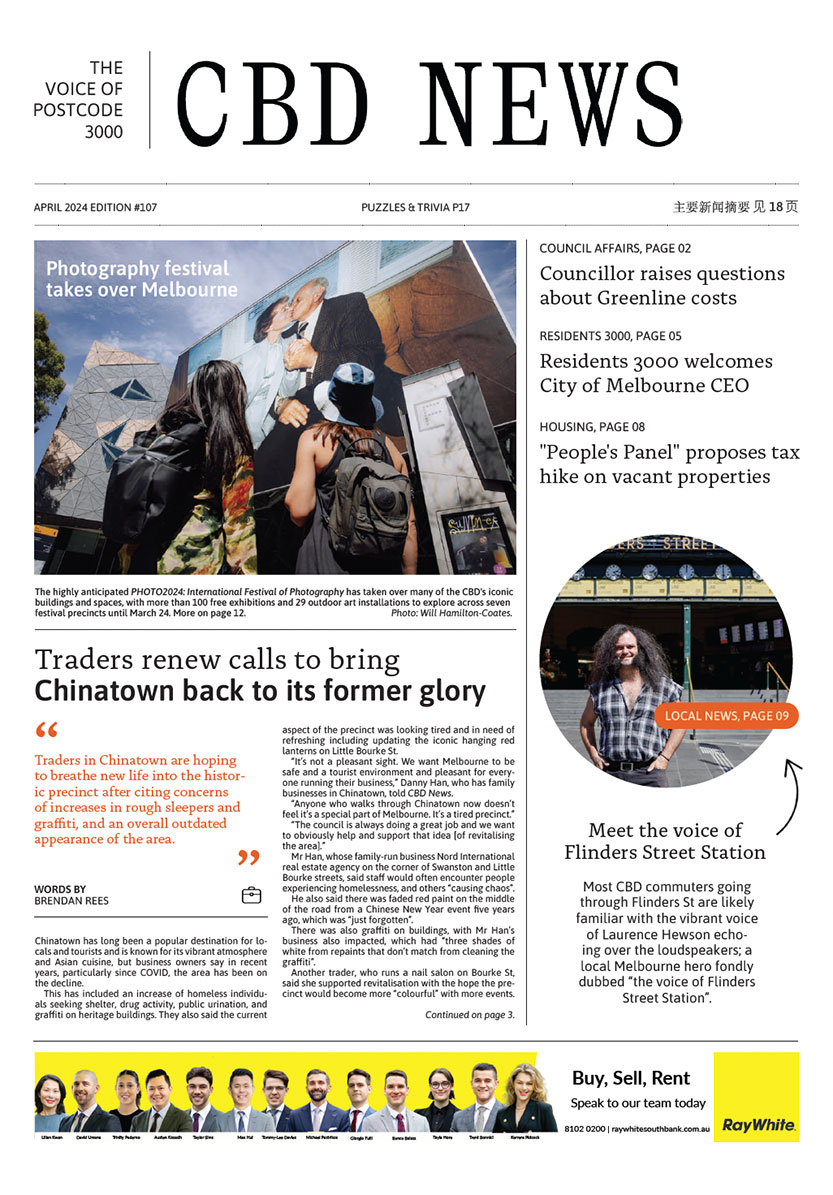Outdoor dining a ray of sunshine over a quiet holiday break
By Jess Carrascalao Heard
Sunshine stretching over empty streets: a bizarre sight for the holiday period in Melbourne’s CBD.
With tourism hindered, offices still not at full capacity, and even many Melburnians staying away, low foot traffic post-COVID has made trade difficult.
“It’s been very, very flat,” Tim Davey, manager of Self Preservation café on Bourke St told CBD News on Friday, January 15. “I mean, looking out there now, it feels like a Sunday morning.”
But even through this otherwise bleak trading landscape, there has been one ray of warmth for Melbourne’s hospitality venues: the pleasant, new reality of extended outdoor dining.
Since the beginning of October last year, hospitality venues have been able to apply for free extended dining permits to help them keep trading in a COVID-safe manner.
Mr Davey loves it.
“Shame the sun’s not out today,” he said. “Yesterday was lovely sitting out there. And people constantly say, ‘Oh, it feels as though I’m in Europe.’”
The permits have allowed hospitality venues to use on-street parking immediately outside their businesses as dining areas or “parklets”.
On-street parking is raised to curb height, covered over and fenced in with planter boxes, giving diners the opportunity to have their meal in a picturesque, open-air setting.
“It’s the barrier it creates between us and the street, I think is one of the major things. And obviously, space,” Mr Davey said.
Venues can also join up with neighbouring businesses to take over on-street parking, footpaths and street space, and even adjacent laneways.
Self Preservation is one of a string of cafés to take advantage of extended dining between Exhibition and Crossley streets, stretching from Florentino to Pellegrini’s.
Mr Davey thinks this link, along with the location, is one of the reasons why the scheme has worked so well for his café.
“We’ve got the width of Bourke St. We get the afternoon sun here. It’s fantastic. It just feels good, doesn’t it?” he said.
For other venues, the low foot traffic has even made taking advantage of extended dining more difficult.
According to Danny Doon, President of the Chinatown Precinct Association inc., larger restaurants in that area have not taken the opportunity to expand into nearby laneways.
He said this was because restaurants were not able to get enough patrons seated inside, despite the limitation on numbers due to COVID restrictions.
“That is why some of the laneways, they didn’t use outdoor dining, because not enough customers inside,” he said.
But he thought that for smaller venues which were easier to fill, having the option of customers spilling out on to the parklets worked well.
Fonda Mexican, in Flinders Lane, has also has a parklet on the street, and Natasha Jackson, a team leader at the restaurant, said it’s not only during the day that customers love dining outdoors.
“It’s good at night-time, when it’s sort of warm, and everyone’s drinking cocktails and they just want to stay outside,” she said.
For Fonda Mexican, the pinnacle of outdoor dining happened over New Year’s Eve and Day.
With large outdoor gatherings banned and no planned fireworks display, the City of Melbourne, with the Victorian Government and Melbourne Food and Wine Festival instead ran Street Feasts, which ran over two days.
European-style piazzas were created in Melbourne’s laneways, and New Year revellers had to book a table to ring in 2021, dining outdoors at some of Melbourne’s best and most exciting venues.
As a participating restaurant, Fonda Mexican had a busy night and according to Ms Jackson, served more than 300 people.
“People just want to go out and have a bit of fun,” Ms Jackson said. “The city was really trying to keep people on the inside, so that’s why they did the festival where everyone booked tables.”
But it wasn’t long before Fonda Mexican went from being busy over the New Year to being empty. In early January, the restaurant was identified by the Department of Health and Human Services (DHHS) as a COVID exposure site.
According to Ms Jackson, the first the restaurant heard about the listing was via a screenshot a colleague had sent of the DHHS website.
“We were so confused. We didn’t know what was going on,” Ms Jackson said.
They shut down the restaurant, and after a call from the DHHS, the venue underwent a deep clean.
“We were only closed for 24 hours. But one problem was half the staff had to isolate for 14 days,” Ms Jackson said.
But the news about the exposure site meant that understaffing at the time was not a problem.
With more office workers set to return to the CBD, traders hope there will be a pick-up in business.
Ms Jackson welcomed their return.
“It’s really good to see the office people coming back slowly,” she said. “It makes us really excited to have them back, because they come in big groups usually.”
As well as the return of office workers, Mr Davey is keen to see theatres re-open.
Having shrunk the business to four days per week, he said the plan was to gradually expand the business out again.
“It’s going to be bit by bit,” he said.
The beginning of January carried with it an eerie tranquillity, but as the month progressed and people trickled back to the city, the hum of conversation and the clink of cutlery returned to the city streets.
The extended outdoor dining permits are currently temporary, but Mr Davey hopes that will change.
“I’ve just spoken to the City of Melbourne, actually,” he said. “I said, ‘I love it. I want it to stay.’”

Backloading across borders with Transcorp – navigating interstate moves with ease






 Download the Latest Edition
Download the Latest Edition